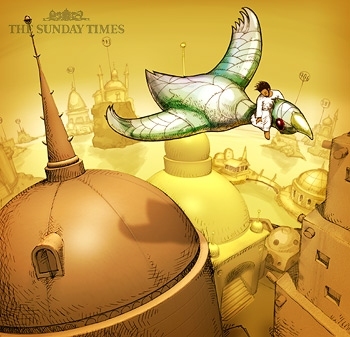
What’s the point of stories that aren’t even true?
They’re the most important. In politics they’re called myths.
One of the most disturbing trends of our time is that of liberals who live in the past.
It’s a natural inclination. Liberalism was the dominant American political philosophy until 1968. Ever since we have lived under a conservative assumption. Liberals are prone to ask why, but when they do they wind up lost in another lifetime.
This is important to realize. Markos Moulitsas, the Kos of DailyKos, was born in September, 1971. He wasn’t even a "gleam in the eye" of his parents when Nixon was first elected. He was a babe in arms when McGovern was nominated.
The same is true, sometimes more so, for most of today’s Netroots activists. I know there are some oldsters around (like me). But we’re not driving the train. We’re sitting in the club car, sharing drinks and tales of the old days.
Here’s a good example. Digby at Hullaballoo recommends Rick Perlstein’s piece dissecting the 1972 election and (supposedly) proving that the anti-war forces were right, and popular, so the whole political myth we live under is bogus.
Let me say this in words of one syllable. Myths don’t have to be true. Most aren’t. They’re mixtures of truth, rhetoric, and imagination. George Washington didn’t chop down the cherry tree, but the myth still had power. Abraham Lincoln wasn’t born in a log cabin he built with his own hands, but the myth had power. Franklin Roosevelt didn’t really overcome polio, but that myth was vital.
Nixon wasn’t right about Vietnam but it’s the fact that this is believed which makes it politically powerful. Still, the belief does not mean we must be eternally wedded to the past. When it’s obvious the existing myths have failed (and I’d say a 30% approval rating is pretty obvious) then the time has come for new myths to emerge.
All of which makes Jim Webb incredibly important.
Webb is a writer and historian. He spent most of his life as a Republican, even serving as Secretary of the Navy under Ronald Reagan. (You say that name like the Randolph Scott line in Blazing Saddles.) He has spent his life working on the politics of myth.
Webb’s own conversion to the Democratic Party may be the most vital element in his myth, just as Reagan’s conversion to the Republican Party was an important element in the Nixon-era myth. Webb is very proud of his Scots-Irish ancestry, and became a Republican when, he felt, elite Democrats abandoned his people in social experimentation — the damned hippies. Now there are no more hippies, and he sees the world with new eyes. He sees the practical result of Republican Class Warfare, he sees the Martial History of his people being wasted on a foreign shore, and he’s Paul after Damascus.
But his story is not definitive. Jim Webb’s story is just one thread in the streams of story. Yes, I’m about to go on a Salman Rushdie jag again.
In Haroun and the Sea of Stories,
his childrens’ book (and the most important such book written since The Wizard of
Oz) Rushdie writes of an imaginary land called Kahani.
What nurtures
Kahani is the Ocean of the Streams of Story. All the stories in the
world come together, mix together, and become new stories that nurture Earth-bound storytellers like Haroun’s father, Rashid.
Then Khattam Shud pollutes the ocean, aiming to destroy all
stories. It is the struggle against censorship that
is Haroun’s theme, and it’s a theme that speaks to all people, all over
the world, today.
But especially American people.
Because it’s absolutism in all its guises that is the real Khattam
Shud. Those who make common cause with such absolutists, those who
would keep new stories from forming, are the real enemy. When we
are told don’t say that, don’t think that, that is Khattam Shud here
among us. And we all have an obligation in that case to become Haroun,
to reject the censor, to protect the story and the story telling process.
The so-called War on Terror began with a great Khattam Shud,
stage-managed by the Bush Administration. All the things that happened
to the Dixie Chicks (left), and to others who dared speak truth to power,
these acts are being repeated endlessly around the world right now —
in China by the Communists, in Russia by the Putinists, in Iran by the
Mullahs, in India by the Hindus, and back in our own country as well.
Webb has his story. He is the Democrats’ new Shah of Blah. I have my
story. You have your story. What’s most important is that these streams
be allowed to flow, that the Kahani we call the Internet be protected
against pollution, by the forces of Khattam Shud.
That’s the point of stories that aren’t even true. They have power. They are power.
If you want to know the roots of Internet Politics, or Open Source Politics, it’s all there. Get it for your kids today.
The values of speech, the virtual press, of having all voices heard, so that we have the power to change our stories, to change our minds, these are the values we fight for. These are the values that are necessary to face today’s challenges.













